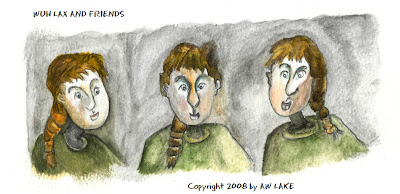
WUH LAX WAS SURPRISED AT ME !
Who said that the profit motive works? If the profit motive worked, we would have saved billions of lives of people in developing countries who have died of disease. As it is, the children have died and we are responsible for not pushing our governments in Western economise to act more decisively and more effectively. I can think of no better solution to many economic problems that an over expansion of the therapeutic research at government expense ... forget the private sector. It has failed to deliver the goods to the third world. Why should we help the third world fight disease?
That to me is almost a stupid question, but my children tell me not to use the word stupid, so I will say that it is an insane question. Are we insane not to give everything we have got to eradicating the problems of the third world. I think the whole of Western Civilization is pretty damn insane not to. we talk about being Christians, and we talk about being Islamic and yet we have so many people dying from disease in third world countries that we should all be thoroughly ashamed. Disease is every one's problem.
The West is so caught up in its struggle against cancer that it has forgotten the many more dying of diseases that we can actually cure. And, incidentally in the process we may just get to grips with some of the disease issues in the West that are connected to those of third world countries.
But, the insane part of this whole matter is the patent system that we are using to calm our feelings of guilt. No, our governments should fund at public expense massive amounts of research that is presently going into weapons of mass destruction and bullets, not to mention bombs and tanks. To not help our third world countries fight disease is insane economics.
Why does Bill Gates have to show our people the right direction? He has done enough to create the microcomputer revolution. Three cheers for Bill and his lovely wife! Our governments can lower interest rates for the banks, but they can't fund research into disease solutions. That is insanity at its worst and we are all part of that insanity. Help the people of the world. Help the children who are dying by helping to eradicate the diseases around the world that ravage their populations. Our globe is getting smaller and smaller and we need to think of each other as being like close neighbours, giving our neighbours a helping hand.
Why does Bill Gates have to show our people the right direction? He has done enough to create the microcomputer revolution. Three cheers for Bill and his lovely wife! Our governments can lower interest rates for the banks, but they can't fund research into disease solutions. That is insanity at its worst and we are all part of that insanity. Help the people of the world. Help the children who are dying by helping to eradicate the diseases around the world that ravage their populations. Our globe is getting smaller and smaller and we need to think of each other as being like close neighbours, giving our neighbours a helping hand.






